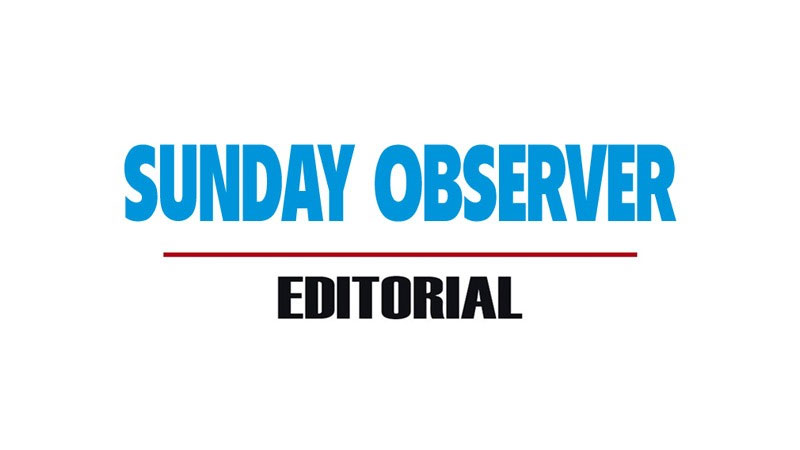United States (US) President Donald Trump released a second wave of letters sent to U.S. trading partners in Asia, Africa and Europe on Wednesday, continuing the administration’s roll-out of new tariff rates on imports from nearly every country in the world that are due to go into force on August 1, a three-week grace period from July 9, the original date.
Sri Lanka was among the countries that received such a “tariff letter”, which announced that imports to the US from Sri Lanka will be taxed at 30 percent, a reduction of 14 percent from the originally planned 44 percent. This is no doubt a substantial reduction, but by no means a cause for celebration as a 30 percent tax/duty is still too high for our apparels and other exports to the US. According to the latest available statistics, Sri Lanka generally exports goods worth US$ 3 billion per year to the US, a significant proportion of the country’s total exports.
Sri Lanka has fared better than many other Asian countries such as Thailand (36 percent), Bangladesh (35 percent), Laos and Myanmar (40 percent), Cambodia (36 percent) and Indonesia (32 percent). But one caveat should be mentioned here – it is not the countries that pay the “reciprocal” taxes per se – rather, it is the consumers in the importing country (in this case the US) that pay the additional duties or taxes. But in the process, our products will become more expensive and less appealing than similar products from countries that will be taxed at a much lower rate (10 percent to 20 percent). Obviously, the consumer will go for the lower priced options, unless the quality of the higher priced product justifies the purchase.
In an ideal world, trade should be completely free, sans taxes, duties and even Non-Tariff Barriers. Tariffs are an anachronism that do not belong in a modern trading environment. They are not “beautiful” in any sense of the word. But so many countries impose tariffs and other protectionist measures to raise revenue and also (apparently) to protect their industries.
But now that tariffs are here to stay, the next best step is to negotiate with the US trade authorities to bring down the tariffs to at least 10-15 percent, if not zero. Our representations following the initial imposition of the 44 percent tariff rate seem to have had an effect, as reflected by the new 30 percent level.
Sri Lankan authorities should seriously consider lifting many tariff and non-tariff barriers that hinder trade with our partners, not just with the US. True, the country faced an unprecedented economic crisis in 2022, the effects of which are still being felt. But we have moved on to a great extent from those dark days and the economy has stabilised under the watchful eyes of the International Monetary Fund (IMF) and also thanks to certain prudent fiscal measures implemented by the Government. This may give us some leeway to open up our markets sans certain barriers.
But this could also lead to other complications. If Sri Lanka decides to tax an Electric Vehicle made in the US at only 30 percent, other EV manufacturing countries will also seek the same treatment. Besides, with today’s global manufacturing hubs and supply chains, an “American” car could actually be made by Magna Steyr in Austria. In that case, is the car American or Austrian? An Apple iPhone, assembled in India or China, contains parts from nearly 100 countries. Only the brand is American, the product is global.
In this context it is better for countries such as Sri Lanka to concentrate more on bilateral trade deals or Free Trade Agreements (FTAs). Sri Lanka has signed several FTAs with Asian countries and an FTA with the US has been on the radar for some time. Sri Lanka must also do more to increase trade within the SAARC countries taking advantage of the South Asia Free Trade Area (SAFTA).
While more trade within the Global South is welcome, the developed world should also lend a helping hand to trade partners from the developing world. Just a day after President Trump’s letter to President Anura Kumara Dissanayake was released, the United Kingdom (UK) unveiled a package of reforms to simplify imports from countries such as Sri Lanka under the Developing Countries Trading Scheme (DCTS). This will enable a number of Sri Lankan products to enter the UK market duty and tax free, making them cheaper for UK consumers.
We hope that the European Union (EU) will also continue its GSP+ scheme, without attaching too many conditions on developing nations. More developed countries, including Japan and South Korea, must look at such trading schemes which will help economically challenged countries.
“Trade, not aid” is a common slogan but now the time has come to put that into practice by lifting the barriers that hinder free trade. An equitable, fair trading system will be a prescription for the present ills of world trade.






